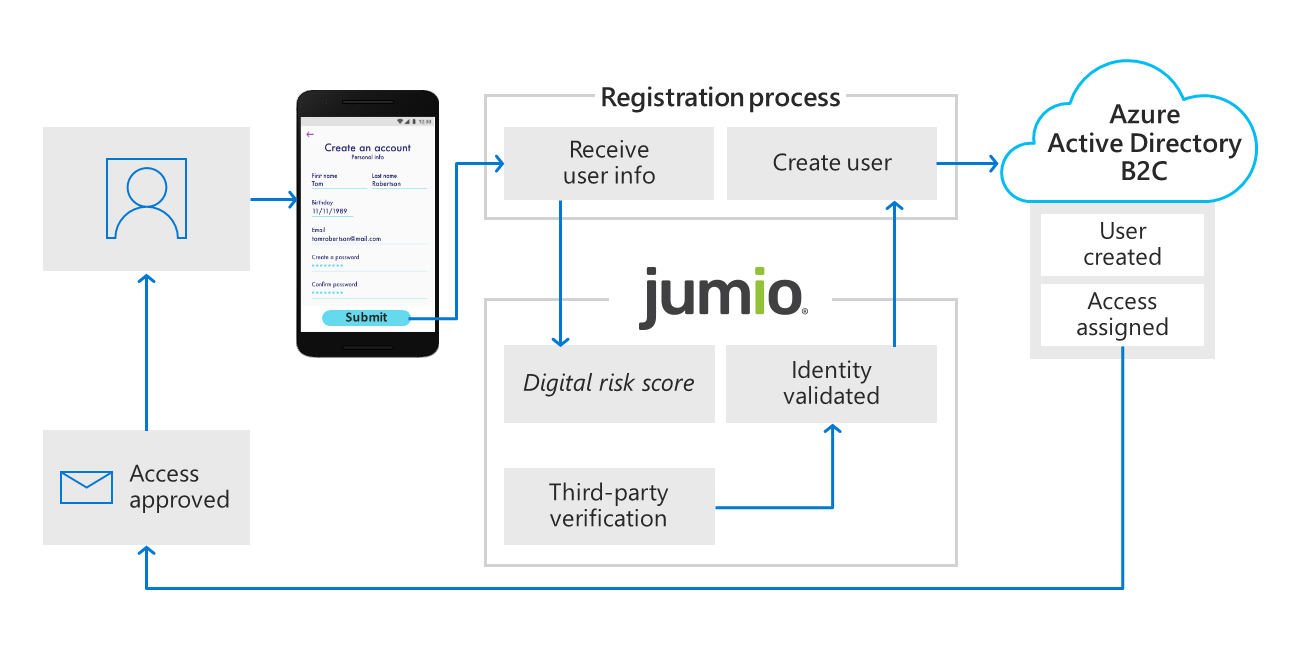Identity Review | Global Tech Think Tank
Keep up with the digital identity landscape.
Jumio, an AI-driven identity verification provider, announced in September that its end-to-end biometric identity verification solutions are now integrated into the Microsoft Azure Active Directory for B2C customers. Their state-of-the-art identity authentication technology gives users of Azure Active Directory, Microsoft’s cloud-based identity and access management system, a tool to verify new customers before assigning them login credentials and access to the user’s business.
“Before giving carte blanche access to your application, it’s increasingly important to quickly verify the authenticity of online users, especially in light of recent, large-scale data breaches,” said Dean Hickman-Smith, CRO of Jumio. “We help modern enterprises, such as Azure AD B2C customers, verify the identities of remote users, so that companies can confidently greenlight legitimate individuals and assign them the appropriate access privileges.”
In the age of ubiquitous social media and subsequent data privacy vulnerabilities, it has become increasingly important for institutions to move away from traditional methods of identity verification that rely on information corroboration. Even methods such as out-of-wallet knowledge questions or shared secrets that rely on less widely-available information are beginning to become less and less secure. The 2019 Gartner Market Guide for Identity Proofing and Corroboration endorses new methods of identity verification, saying that “the concept of high memorability, low availability data has become archaic since the rise of social media and the subsequent plethora of breached data available through underground organizations.”
Biometrics have rapidly risen as one of the most effective tools to fill this verification hole. A 2018 NIST report by the U.S. Department of Commerce showed that facial recognition biometric identification had a 0.2% failure rate, an improvement of around twentyfold from four years ago when the failure rate was around 4%. Biometrics are rising as a convenient and highly effective identity protection tool.
Jumio’s technology makes the identity verification process accurate and easy. First, users take a picture of a government-issued ID, and then take a corroborating selfie. AI is then used to verify that the selfie and the person in the ID match, and an additional liveness check ensures that a person was physically present in the selfie in order to protect against deepfakes and computer-generated images.

Identity verification organizations like Jumio are leveraging cutting-edge tools like AI, machine learning and biometrics to help organizations fight fraud and meet KYC and AML regulations. With identity theft, data breaches, and fraud on the rise, digital identity verification has never been more important. Jumio’s business is growing, having already worked with many companies across multiple industries to verify more than 250 million identities issued by over 200 countries and territories.
“We’re pleased to offer Jumio’s identity verification solutions to Microsoft Azure Active Directory B2C customers,” said Sue Bohn, Partner Director Program Management at Microsoft. “Through the power of biometrics and AI in Jumio, Microsoft Azure B2C customers can verify the digital identities of consumers remotely in a fast and scalable manner.”
ABOUT THE WRITER:
Lydia You is a computer scientist from Princeton University living in New York City. She is a Tech Innovation Fellow at Identity Review covering the intersection of technology, internet culture and the future of digital media.